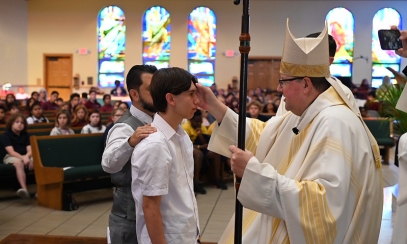
Prayer and the Challenges to Responding Well
Getting your Trinity Audio player ready...
Prayer is a gift of God’s grace to us. It is not something we merit. Consequently, prayer calls for our response. If we want to respond well to the gift of prayer, it might prove fruitful for us to consider some of the things the Catechism says can stand in our way.
Prayer is a gift of God’s grace to us. It is not something we merit. Consequently, prayer calls for our response. If we want to respond well to the gift of prayer, it might prove fruitful for us to consider some of the things the Catechism says can stand in our way.
False notions and “worldly” attitudes
False notions of prayer can keep us from fully living the life of prayer. For example, we might fall into the trap of thinking of prayer as simply one of many aspects of our lives: a simple psychological activity; an act of concentration to reach a quiet mind; the rote repetition of words and postures; an activity for our spare time; or a “when all else fails” appeal for help.
“Worldly” attitudes can undermine the life of prayer. Prayer can be discounted as false because its efficacy, beyond its therapeutic benefits, cannot be verified by reason and science. It can be deemed unproductive, unprofitable and, therefore, useless. It can also be viewed as an escape from reality – a coping mechanism in reaction to a stressful and “hyperactive” world.
Discouragement
The life of prayer can be marked by seasons of dryness that leave us “with no taste for thoughts, memories, and feelings, even spiritual ones.” (CCC 2731) Sadness can also overtake us if we realize that we have not given all to the Lord. We can become discouraged with prayer if we feel we are not being heard according to our own will. We can pridefully refuse to accept that prayer is a free and unmerited gift rather than something within our power to obtain.
Distraction
Distraction frequently prevents us from responding well to the gift of prayer. At the same time, the Catechism (2729) suggests distraction can be beneficial if we pay attention to it, “for a distraction reveals to us what we are attached to, and this humble awareness before the Lord should awaken our preferential love for him and lead us resolutely to offer him our heart to be purified.”
Another, often hidden, temptation that haunts our response is the failure to make our faith a priority. When we pray, “a thousand labors or cares thought to be urgent vie for priority.” (CCC 2732) Prayer can easily fall into place behind all of these.
The real danger
Any of these impediments to prayer can cause us to wonder why we should pray at all. The real danger is that acedia, or sloth, sets in. Sloth is one of the seven deadly sins. It is “a form of depression due to lax ascetical practice, decreasing vigilance, carelessness of heart.” (CCC 2733) Acedia cuts us off from the life of prayer because apathy sets in. As the Pontifical Council for Culture in 1994 observed, acedia, or spiritual apathy, is characterized by the attitude, “I don’t know if there is a God or not … either way, it doesn’t matter anyway.”
In Closing
The awareness of all that can detract from our response to the gift of prayer is not sufficient. We must also study those qualities and habits that positively contribute to a more full response to this gift of immeasurable value. We will take on this study in our next column.
Don’t despair and refocus attention on God
Try not to become discouraged if you struggle with some of the challenges we, as humans, experience in our lives of prayer. St. Thérèse of Lisieux wrote this about being distracted during prayer:
“I also have many [distractions] but as soon as I am aware of them, I pray for those people the thought of whom is diverting my attention, and in this way they reap benefit from my distractions.”
In her autobiography, Story of a Soul, she also discussed the difficulties she once experienced with the rosary:
“When alone, (I am ashamed to admit it) the recitation of the rosary is more difficult for me than the wearing of an instrument of penance. I feel I have said this so poorly! I force myself in vain to meditate on the mysteries of the rosary; I don’t succeed in fixing my mind on them.” (Story of a Soul, 243)
St. Thérèse is a Doctor of the Church and even she struggled with distractions! But read on to see how she turned to the Blessed Mother and put her trust in her:
“For a long time I was desolate about this lack of devotion that astonished me, for I love the Blessed Virgin so much that it should be easy for me to recite in her honor prayers which are so pleasing to her. Now I am less desolate; I think that the Queen of heaven, since she is my MOTHER, must see my good will and she is satisfied with it.” (Story of a Soul, 243-44)
Doug Culp is the chancellor for the Catholic Diocese of Lexington.



